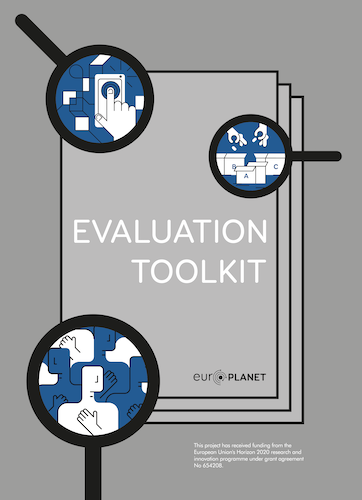The Europlanet Evaluation Toolkit
- Europlanet 2024 Research Infrastructure (RI), University of Kent, Canterbury, United Kingdom of Great Britain – England, Scotland, Wales (anita.heward@europlanet-eu.org)
Evaluation can provide essential information in understanding the effectiveness and accessibility of outreach activities in engaging diverse communities.
In this presentation, we will give an overview of the Europlanet Evaluation Toolkit, a resource that aims to empower outreach providers and educators in measuring and appraising the impact of their activities. The toolkit is intended to provide advice and resources that can be simply and easily integrated into normal outreach and education activities. It is available as an interactive online resource at http://www.europlanet-eu.org/europlanet-evaluation-toolkit/, as a downloadable PDF and as a hard copy (including a book and set of activity cards).
The toolkit has been developed over a number of years with content provided by professional outreach evaluators Karen Bultitude and Jennifer DeWitt (UCL, UK). Initially, a series of focus groups and scoping discussions were held with active outreach providers from the planetary science community in order to determine what they wanted from such a toolkit, and what sort of tools would be of most interest. A shortlist of tools was developed based on these discussions, with volunteers testing out the tool instructions once they were drafted.

The toolkit begins with a brief introduction to evaluation and steps to choosing the right tools. This advice takes the form of a series of questions to help design an evaluation approach and make the most efficient and effective use possible of limited time and resources.
The toolkit offers a choice of 14 data collection tools that can be selected according to the audience (e.g. primary, secondary, interested adult, general public), the type of environment and activity (e.g. drop-in, interactive workshop, ongoing series, lecture/presentation or online) or according to when they might best be used (during, beginning/end, or after an event). The online version of the toolkit includes a set of interactive tables to help with the selection of which tool is most appropriate for any given situation.
The toolkit includes descriptions and worked examples of how to use two techniques (word-clouds and thematic coding) to analyse the data, as well as some top tips for evaluation and recommended resources.
For some of the tools, case study examples include information about how the tools have been used in the context of an event, how data was actually collected and analysed and what conclusions were reached, based on the data gathered.
Over the past year, videos and training resources for using the toolkit have been added, as well as virtual alternatives to the physical tools.
The Europlanet Evaluation Toolkit has received funding from the European Union’s Horizon 2020 research and innovation programme under grant agreement No 871149 (Europlanet 2024 RI) and 654208 (Europlanet 2020 RI).
How to cite: Heward, A. and DeWitt, J.: The Europlanet Evaluation Toolkit, European Planetary Science Congress 2021, online, 13–24 Sep 2021, EPSC2021-275, https://doi.org/10.5194/epsc2021-275, 2021.

